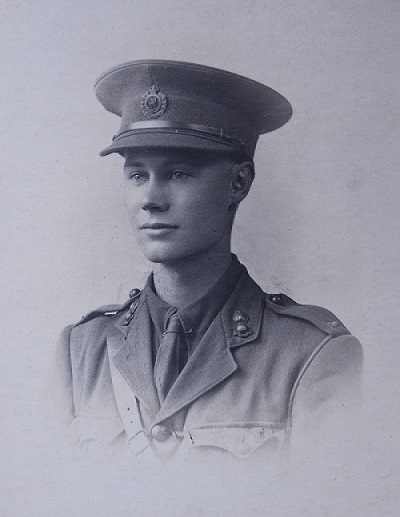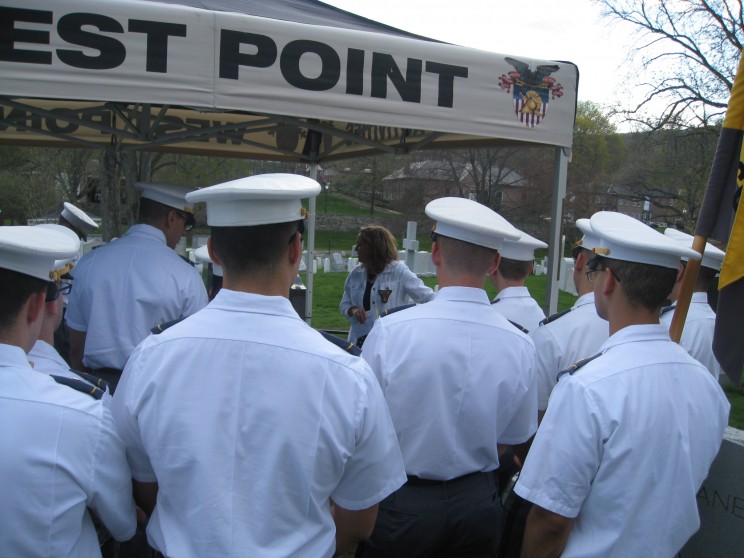The First World War has survived as part of our national memory in a way no previous war has ever done. Below is an extract from Full of Hope and Fear: The Great War Letters of an Oxford Family, a collection of letters which lay untouched for almost ninety years. They allow a unique glimpse into the war as experienced by one family at the time, transporting us back to an era which is now slipping tantalizingly out of living memory. The Slaters – the family at the heart of these letters – lived in Oxford, and afford a first-hand account of the war on the Home Front, on the Western Front, and in British India. Violet and Gilbert’s eldest son Owen, a schoolboy in 1914, was fighting in France by war’s end.
Violet to Gilbert, [mid-October 1917]
I am sorry to only write a few miserable words. Yesterday I had a truly dreadful headache which lasted longer than usual but today I am much better . . . I heard from Katie Barnes that their Leonard has been very dangerously wounded they are terribly anxious. But are not allowed to go to him. Poor things it is ghastly and cruel, and then you read of the ‘Peace Offensive’ articles in the New Statesman by men who seem to have no heart or imagination. I cannot understand it . . . You yourself said in a letter to Owen last time that [the Germans] had been driven back across the Aisne ‘We hope with great loss.’ Think what it means in agony and pain to the poor soldiers and agony and pain to the poor Mothers or Wives. It is useless to pretend it could not be prevented! We have never tried any other way . . . No other way but cruel war is left untried. I suppose that there will be a time when a more advanced human being will be evolved and we have learnt not to behave in this spirit individually towards each other. If we kept knives & pistols & clubs perhaps we should still use them. Yesterday Pat & I went blackberrying and then I went alone to Yarnton . . . the only ripe ones were up high so I valiantly mounted the hedges regardless of scratching as if I were 12 & I got nice ones. Then I went to the Food Control counter & at last got 5 lbs. of sugar . . . It was quite a victory we have to contend with this sort of sport & victory consists in contending with obstacles.
Gilbert to Owen, [9 February 1918]
I have been so glad to get your two letters of Dec. 7th & 18th and to hear of your success in passing the chemistry; and also that you got the extension of time & to know where you are . . . I am looking forward to your letters which I hope will make me realise how you are living. Well, my dear boy, I am thinking of you continually, and hoping for your happiness and welfare. I have some hope that your course may be longer than the 4 months. I fear now there is small chance of peace before there has been bitter fighting on the west front, and little chance of peace before you are on active service. I wonder what your feelings are. I don’t think I ever funked death for its own sake, though I do on other accounts, the missing a finish of my work, and the possible pain, and, very much more than these, the results to my wife & bairns. I don’t know whether at your age I should have felt that I was losing much in the enjoyment of life, not as much as I hope you do. I fear you will have to go into peril of wounds, disease and death, yet perhaps the greater chance is that you will escape all three actually; and, I hope, when you have come through, you will feel that you are not sorry to have played your part.

Second Lieutenant Owen Slater ready for service in France. Photo courtesy of Margaret Bonfiglioli. Do not reproduce without permission.
Owen to Mrs Grafflin, [3 November 1918]
This is just a very short note to thank you for the knitted helmet that Mother sent me from you some time ago. It is very comfortable & most useful as I wear it under my tin hat, a shrapnel helmet which is very large for me & it makes it a beautiful fit.
We are now out at rest & have been out of the line for several days & have been having quite a good time though we have not had any football matches & the whole company is feeling rather cut up because our O.C. [Officer Commanding] has died of wounds. He was an excellent [word indecipherable] father to his men & officers.
Margaret Bonfiglioli was born in Oxford, where she also read English. Tutoring literature at many levels led to her involvement in innovative access courses, all while raising five children. In 2008 she began to re-discover the hoard of family letters that form the basis of Full of Hope and Fear. Her father, Owen Slater, is one of the central correspondents. After eleven years tutoring history in the University of Oxford, James Munson began researching and writing full-time. In 1985 he edited Echoes of the Great War, the diary of the First World War kept by the Revd. Andrew Clark. He also wrote some 50 historical documentaries for the BBC.
Subscribe to the OUPblog via email or RSS.
Subscribe to only history articles on the OUPblog via email or RSS.
The post The Great War letters of an Oxford family appeared first on OUPblog.

By Michael D. Matthews
My daily walk to work takes me through West Point’s cemetery. Founded in 1817, the cemetery includes the graves of soldiers who fought in the American Revolution, and in all of the wars our country has fought since. I often stop and reflect on the lives of these men and women who are interred here. Many headstones are of West Point graduates who were killed in World War II, including several on D-Day. Others fell in the Civil War, the Spanish-American War, World War I, and Korea and Vietnam. One section holds special significance for me, since it contains the graves of former cadets and colleagues I have known in the past 14 years who died in Iraq or Afghanistan. No matter how preoccupied I may be with the vagaries of day to day life, a sense of peace and calm envelopes me as I stroll among the headstones. I feel I am among friends and comrades and there is a sense of connectedness with the past.

One of the soldiers interred at West Point is Lieutenant Christopher Kurkowsi. Chris graduated from West Point in 1986 with a degree in Engineering Psychology. He became an artillery officer and was killed on 26 February 1988 when the helicopter he was in crashed while on a routine training mission. At the time of the accident, Chris’s academic mentor at West Point, Lieutenant Colonel Timothy O’Neil, had initiated paperwork to send Chris to graduate school in psychology with a follow-on assignment to his old department at West Point. According to Lieutenant Colonel O’Neil, Chris would have made a tremendous psychologist and professor. Chris’s death exemplifies the loss of talent and potential of all of the soldiers buried at West Point.
Earlier this month, West Point held its annual “Inspiration to Serve” cemetery tour. All members of the West Point Class of 2016, who are finishing their second of four years of academic study and military training at West Point, participated. On this day, classmates, family, or friends of the fallen stand by a gravesite, and tell the story of the deceased to the cadet attendees. Of special interest this year, MaryEllen Picciuto, one of Chris Kurkowski’s classmates, told his story of service and sacrifice. The cadets stood respectfully and listened intently, as Ms. Picciuto brought Chris back to life through her remembrances. As she did this, other cadets stood by other graves, hearing the life story of other West Point graduates who gave their lives in the service of our country.

As a Nation, our move to an all volunteer force has distanced most Americans from direct experience and knowledge of the military and the men and women who serve. Cognitive psychologists make a distinction between semantic and episodic memory. The former is memory of generalized facts that are not part of our own personal experience. The latter, in contrast, are of events personally experienced. Think about your own memories. Those that are episodic are likely more vivid and tangible, and perhaps have more meaning in your own life story. You “know” from semantic memories, but you can “feel” in episodic memories.
Perhaps this Memorial Day, in between picnics and family activities, you can visit a veterans cemetery. Walk among the headstones, read the inscriptions, and reflect on what these men and women sacrificed for our Nation. Like Lieutenant Kurkowski, they had dreams, ambitions, life goals, and family and friends who loved them. Through such a visit, perhaps you can form an episodic memory by honoring the fallen for their service, and in doing so forge a more personal connection with these American heroes.
Note: The views expressed herein are those of the author and do not reflect the position of the United States Military Academy, the Department of the Army, or the Department of Defense.
Michael D. Matthews is Professor of Engineering Psychology at the United States Military Academy. Collectively, his research interests center on soldier performance in combat and other dangerous contexts. He has authored over 200 scientific papers and is the co-editor of the Oxford Handbook of Military Psychology (Oxford University Press, 2012). Dr. Matthews’ most recent book is Head Strong: How Psychology is Revolutionizing War (Oxford University Press, 2014).
Subscribe to the OUPblog via email or RSS.
Subscribe to only brain sciences articles on the OUPblog via email or RSS.
Photos courtesy of Michael D. Matthews. Used with permission.
The post Psychology, veterans, war, and remembrance appeared first on OUPblog.


iTunes users can subscribe to this podcast 
Anatoly Liberman says in his book Word Origins that English is a conservative language when it comes to spelling.
The idea is that even though you might not be able to tell where a word comes from by hearing it, when you see it written down sometimes there are more clues because the spelling often retains evidence of its history.
Such is the case with the word lieutenant. The word arrived in English from French in 1375 and within 100 years the English were pronouncing it “left-tenant” as if there were a “right-tenant” as well. Yet the spelling that influences Americans to say “loo-tenant” survived this pronunciation change back in the old country and also shows us in stark clarity where the word comes from.
If you write lieutenant out, but put a space after lieu, the result is two other common English words.
Lieu might have a bit of a legalistic flavor to it but most people recognize that it means “instead of” or “in place of”—for example: “in lieu of paying me the money, she took me out to dinner.”
Of course a tenant is someone who rents an apartment. They hold the lease on the place and if it’s a nice apartment, in a desirable neighborhood, they might hold onto it tenaciously.
 From Latin then, lieutenant literally means “place holder” and the military lieutenant acts on behalf of—or in place of—their commanding officer.
From Latin then, lieutenant literally means “place holder” and the military lieutenant acts on behalf of—or in place of—their commanding officer.
No one can really say why in the British Army the word is pronounced “left-tenant” but it’s notable that in the Royal Navy the pronunciation seems half way across the ocean. They drop the “f” and say “le-tenant.”
Five days a week Charles Hodgson produces
Podictionary – the podcast for word lovers, Thursday episodes here at OUPblog. He’s also the author of several books including his latest
History of Wine Words - An Intoxicating Dictionary of Etymology from the Vineyard, Glass, and Bottle.








 From Latin then, lieutenant literally means “place holder” and the military lieutenant acts on behalf of—or in place of—their commanding officer.
From Latin then, lieutenant literally means “place holder” and the military lieutenant acts on behalf of—or in place of—their commanding officer.